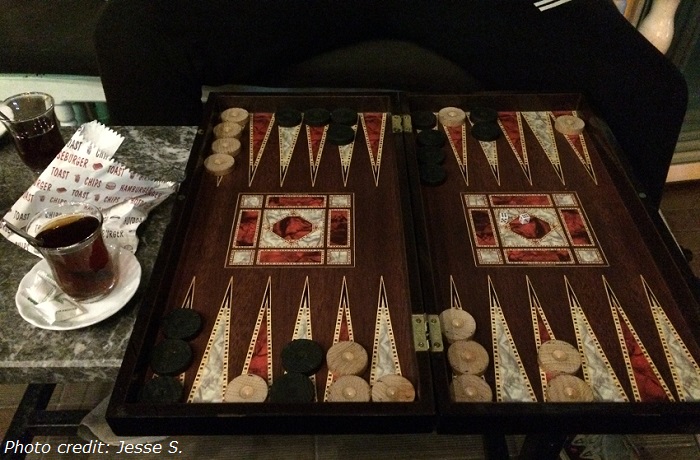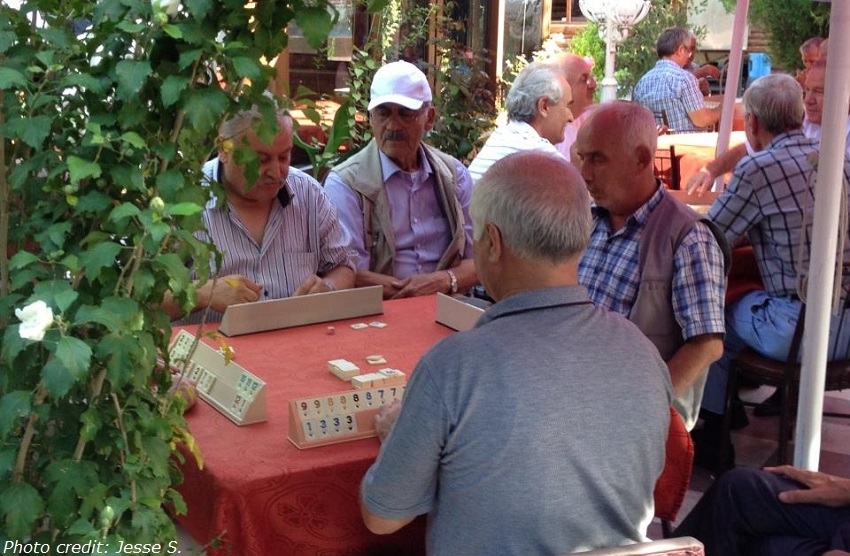A guest post by Jesse S.
It seems like everywhere I go in Bursa I see three things: football on the television, pairs of people of all ages fast and furiously playing tavla (backgammon), and groups of older men peacefully enjoying okey (pronounced “okay,” a game similar to Rummykub). While I often find myself playing football with local guys late into the night on the weekends, I’ve recently also had the neat opportunity to spend a bit of time learning tavla and okey, Turkey’s traditional table games.

I’m still a novice, but one day I hope to be able to play tavla like a Turk. Experienced players seem to be able to cast the dice to the board with a finessed flick of the wrist. Turks move the checkers with speed and veracity, usually pretending to be angry about the dice just rolled or the previous roll of the opponent. Their memorized mathematical shortcuts allow them to effortlessly whisk up their checkers and smash them down with such authority and clamor that you are left with a deafening ringing in your ears. It seems that a good, brisk smash of the checker is necessary for emphasis and intimidation.
Though tavla is a 2-player game, I am often freely offered advice by friends who take it upon themselves to correct my moves. Often, they assume that I don’t know what to do if I am not able to move my checker within the half-second after the dice stops rolling. Many seasoned veteran players use Farsi numbers to count out their checker moves. I, however, prefer to stick to Turkish numbers for now; maybe I’ll switch to Farsi at a later time (or not!).
When playing at the hookah lounge, the loud clatter of quick-rolling dice and fast clicks of moving checkers are heard all around us. My newness to the game, however, often leaves my friend and me playing at a snail’s pace. Despite our slowness, my friend’s frequent smiles seem to reflect his satisfaction with my progress.

As the foursome at my table started a new game of okey, a bucket of tiles was poured out on the table and another round of tea was ordered. At first I just watched silently without asking any questions, using a dictionary to learn a few of the Turkish words that I didn’t know. Noticing I was interested in learning, the men started offering tidbits of information about the game, frequently asking if I understood. As I sat between two of the men, I watched them fidget and move their tiles on their racks to arrange them in the best possible alignment. The four men chit chatted about current events and discussed the fact that no one was getting the tiles he needed to win. Game by game, I began to understand the rules and strategies needed to succeed.
After three or so hours, it came time for me to leave. As I attempted to excuse myself, the men tried to order me another tea and insisted I stay longer. I convinced them I needed to go but that I would definitely come back again. As we shook hands and said goodbye, I tried paying for my five teas. The men reacted with loud objections and grimaces as if I had just deeply insulted them. Another time I could pay for my drinks, they said with laughter, and maybe buy them some sandwiches, too. That week I visited those men three times.
I still haven’t actually played a game of okey. I have much to learn before I venture into the whirlwind (and before the retired guys give me a spot at the table!). I’m also still a beginner at tavla and I get beat nearly every time I play. Still, these games offer me a priceless opportunity to experience local culture and make a few friends.
Wherever you are in Bursa, you are probably only a five–minute walk from an opportunity to play either game. So as you wander the streets of Bursa, keep your ears listening for the not-so-faint slam of the tavla checkers or the click-click-click of the okey tiles. And don’t be afraid to sit down, order a cup of tea, and get in on these fun, interesting Turkish pastimes.









